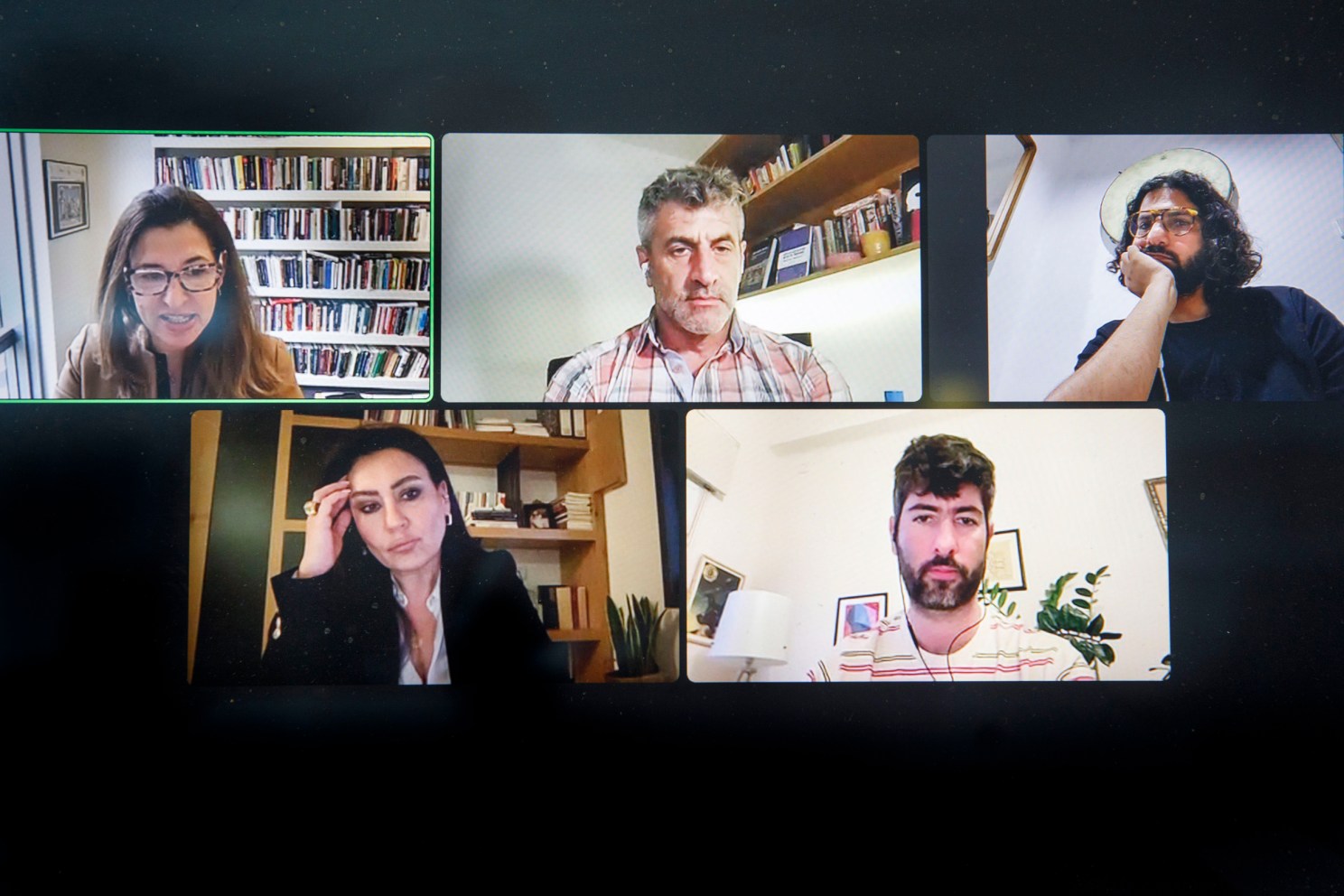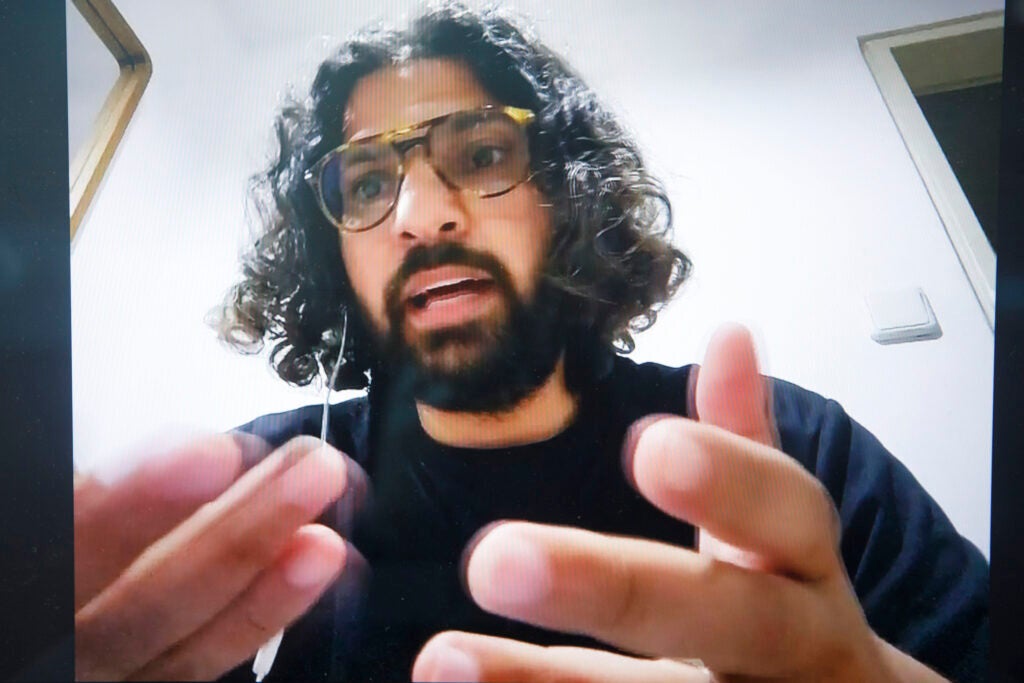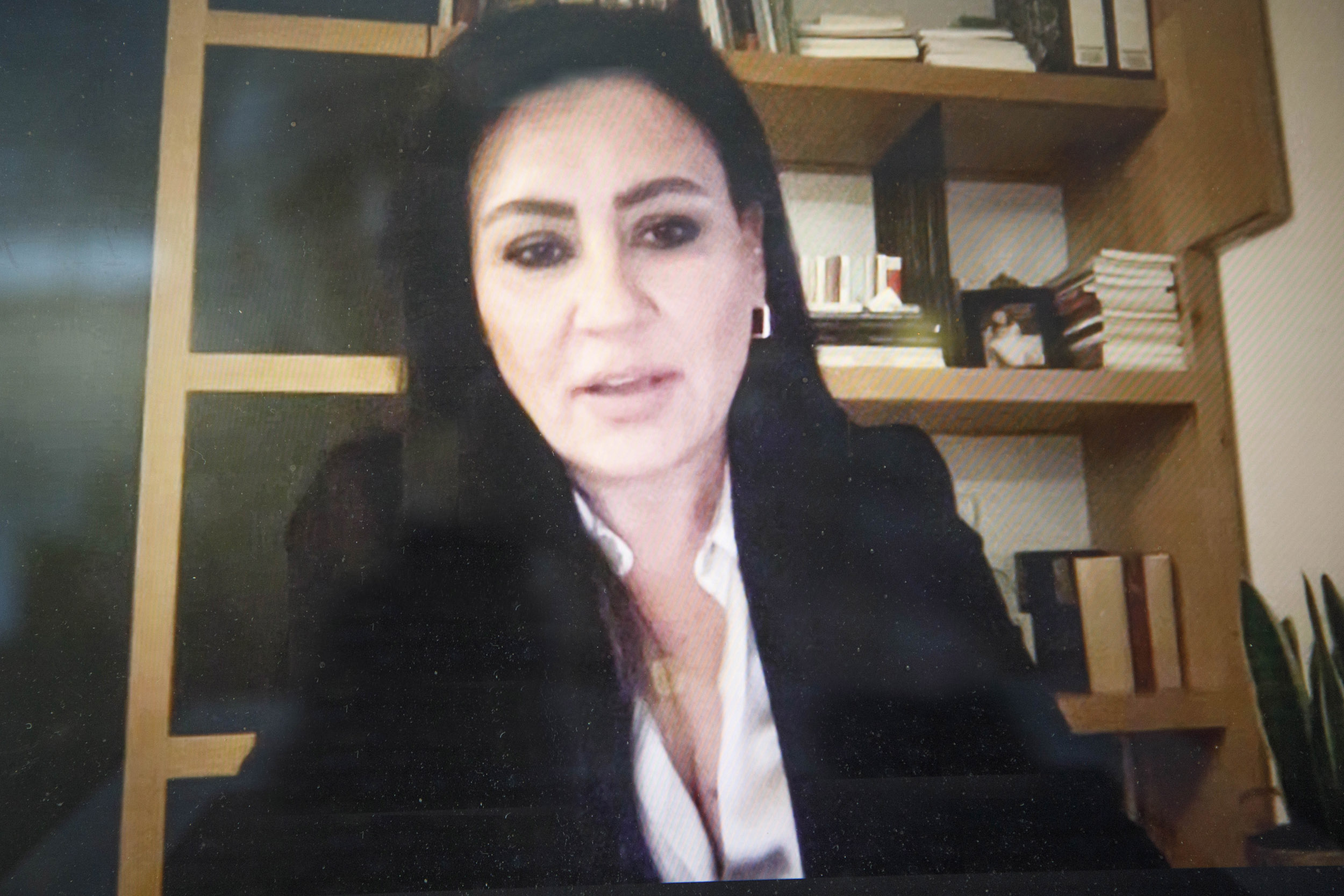
Panelists Melani Cammett (clockwise from top left), Oded Leshem, Mohammad Kundos, Alon-Lee Green, and Rula Hardal.
Photos by Kris Snibbe/Harvard Staff Photographer
Finding middle way out of Gaza war
Educators, activists explore peacebuilding based on shared desires for ‘freedom and equality and independence’ at Weatherhead panel
The world seemed to split in two on Oct. 7, observed political psychologist Oded Leshem.
“You need to be either pro-Israeli and anti-Palestinian or pro-Palestinian and anti-Israeli,” said Leshem, the senior research associate at Hebrew University’s Psychology of Intergroup Conflict and Conciliation Lab. “This is, of course, a huge, huge mistake. And the people who pay the price for that mistake are Israelis and Palestinians.”
The Weatherhead Center for International Affairs convened a fifth conversation in its “Israel/Palestine” series last Wednesday. Previous installments explored history, geopolitics, and civil dialogue, but the educators and activists on this panel spoke to peacebuilding. As divisive political discourse dominates, viewers of the online forum were urged to embrace an alternative.
“There are a lot of common points between the two cultures to focus on,” offered Mohammad Kundos, principal of the Hand in Hand School in Kfar Saba, Israel.

Moderated by Melani Cammett, Weatherhead Center director and Clarence Dillon Professor of International Affairs, the event covered such topics as school integration, coalition-building, and narrative change.
“If we all agree on freedom and equality and independence, the main question we should ask is: ‘Where do we start?’” said Kundos, whose school offers a bilingual Hebrew and Arabic curriculum. “And for me, the first step is education.”
Israeli Jews and Palestinian citizens of Israel traditionally attend separate schools until college. “The idea of Hand in Hand is to start teaching Palestinians and Jewish Israelis together since kindergarten,” he said. “Our goal is to create a common, equal stage for kids to grow up together, to learn about each other, to speak each other’s language fluently — to know each other’s music, food, poetry, history. And by giving them this opportunity, we believe that we’re raising the leaders that in 20, 30 years will be able to come up with a political solution.”
The grassroots Jewish-Arab movement Standing Together operates with full acknowledgement of the conflict’s power differentials, explained national co-director Alon-Lee Green, citing the number of children killed (nearly 14,000) and homes destroyed (more than 70 percent) by Israeli military action in Gaza over the past five months.
“We understand the Palestinians are paying a higher price,” said Green, who worked as a political adviser in the Knesset, Israeli’s parliament, before co-founding Standing Together in 2015. “But when we ask ourselves, ‘Does it mean that the Jewish people are benefiting because of this reality? Do we … profit out of occupation? Out of oppression?’ The answer is no.”

Green remembered gathering the Standing Together coalition following Oct. 7, when Hamas killed roughly 1,200 people and took more than 240 hostages. It was supposed to be an outlet for expressing pain.
“And then we understood that there are forces within our society that are wasting no time — not even one second — to drive our society into very dangerous places,” said Green, whose organization calls for an immediate ceasefire and return of all hostages.
“We understood that there’s not only a war waging on Gaza, there’s actually a war over the soul of our society,” he added. “And we started fighting this war, we started organizing, trying to bring people together, trying to speak about basic solidarity, basic empathy.”
The political organization A Land for All advocates for separate Palestinian and Israeli states under a shared confederacy, said political scientist Rula Hardal, the group’s Palestinian CEO as well as a research fellow at the Kogod Center for the Study of Jewish and Contemporary Thought at the Shalom Hartman Institute.
“We encourage a paradigm shift when we speak about the two-state solution, which is based on sharing the same homeland … and partnership instead of separation,” explained Hardal, who emphasized the region’s common climate, economy, and currency.
Hardal offered the European Union as a model when asked by an audience member for clarification of what her group had in mind. That would enable both flexibility and the level of self-determination both Palestinians and Jewish Israelis, on average, say they require.
“If some part of the nonviolent settlers would like to remain where they live now in the West Bank, in the future Palestinian state, they will be able to be residents in the state of Palestine and keep their citizenship in the state of Israel,” Hardal said.
A Land for All’s plan calls for Palestinians to receive automatic citizenship in a Palestinian state. But they could exercise their United Nations-recognized right of return by applying for residency status in Israel.
Leshem, who lectures and writes about hope as a political phenomenon, noted that bilingual education and Jewish-Arab solidarity movements are not mainstream in Israel today. That makes it all the more important to bolster these efforts, he argued, appealing directly to the panel’s American viewership.
In the aftermath of “acute events” like Oct. 7, Leshem said, history tells us the conflict will go in one of two ways. The first possibility would entail perpetuating hostilities.
“But another pathway is what these organizations are trying to do,” he said. “If we are just observers — if we just look and say, ‘Oh, interesting; where will it go?’ — we are not actually doing the right thing. The only right thing is to support these initiatives, to make sure that the future does not go in the direction of escalation and extremism.”




